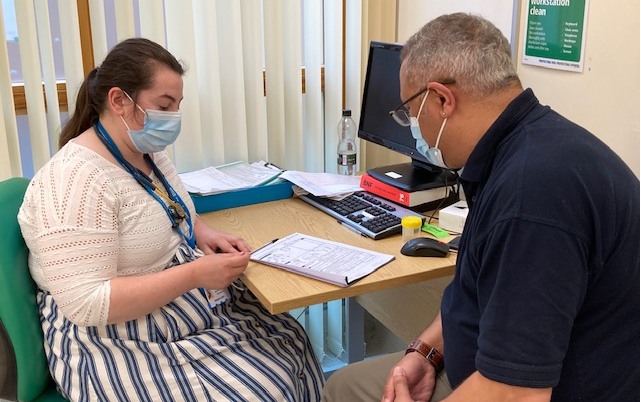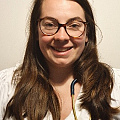Why, as a doctor I’m looking forward to getting involved in more research in the future
I am currently in my third year working as a Doctor and, until last year, I’d never been involved with research or come across clinical research trials. I started as a junior clinical fellow in August 2020, with the opportunity to experience one day a week at the NIHR Manchester Clinical Research Facility at Wythenshawe Hospital to get involved with clinical research.
During medical school, I was aware research was a thing that happened, but I didn’t think it involved me or would impact me. I assumed research was for people in lab coats in a shiny office who never interacted with patients.
Working as a doctor I’ve realised that research is a very important part of medicine. It impacts not only the future of medicine, and the treatments available, but it also involves assessing how effective treatments are, learning about how disease is caused and what we can do to prevent this.
I didn’t feel I understood how research worked though or how to even get involved. I certainly didn’t realise that a large part of research involves working with patients.
When the opportunity to have some time at the CRF at Wythenshawe Hospital came up, as part of my personal development time, I felt this would be perfect. It offered structured time at the research facility to gain some experience and see how it all worked, and even get involved.
My main goal from this placement was to understand how the research ran and what the role of clinical doctors could be.
I want to feel that whatever specialty I end up going into I will understand how research plays a role in it and try and do my part to help advance medicine for my patients.
I was apprehensive about working in a new environment and the challenges I’d face. Initially I began helping with the PHOSP-COVID study – which seeks to investigate the long-term impacts of COVID-19 on the health outcomes for patients who were hospitalised due to the virus. I was seeing patients who were previously hospitalised with COVID-19 and following up how they were feeling months later. Some of these patients had only been in hospital requiring oxygen for a few days, while some had been in intensive care for weeks. My main role in this study was helping collect data about the hospital admissions of these patients and assess how they were doing at the present. This involved a memory test, checking if they had any signs of frailty and reviewing their blood tests and breathing tests to see if there were any abnormalities.

Natasha carrying out a PHOSP-COVID study assessment with a participant
This study showed me how many team members can be involved in running clinical trials. A visit on this trial involved physiologists, clinical research nurses, research practitioners and doctors. The main thing I got from this involvement from PHOSP-COVID was talking to the participants and understanding how COVID-19 had impacted their lives. Their reactions were varied, and everyone was affected in different ways. All the people I met through this study have been so keen to help in any way that they can. For many of these people, their lives have been changed forever with physical and mental challenges. COVID-19 is still so new, and it felt very rewarding being involved in a trial which was trying to look at the long-term effects, to improve patient outcomes.
There were an increasing number of coronavirus cases in autumn 2020, with more inpatient clinical trial participants, who were taking part in new studies. To start with, I was just observing seniors and noted the difference between inpatient studies and the outpatient setting I was used to. The main study I worked on was RECOVERY, which many people have heard of as it showed the benefit of giving the drug dexamethasone to patients with COVID-19 needing oxygen. As we were giving treatments there was a lot more consideration and specific criteria for which patients were eligible to be involved and we had to take into consideration their ability to consent to take part, any other medical conditions they had and to ensure the trial drugs were safe for them.
It was important to understand the trial medications being giving and the pros and cons of being involved to be able to explain it to the patients and ensure they had the full information before taking part. After observing this process and then being observed doing it, I felt confident enough to start doing it independently. It helped grow my confidence in myself and my ability to learn new things and explain them clearly to others. I always felt supported by colleagues in this process and while I was given the opportunity to learn and felt very encouraged to get involved as much as I wanted.
I want to feel that whatever specialty I end up going into I will understand how research plays a role in it and try and do my part to help advance medicine forward for my patients.
Thankfully, COVID-19 numbers have reduced a lot and there have been more non-COVID-19 related studies starting and restarting at the Manchester Clinical Research Facility. I am currently starting to get involved in these and it’s been great to see the range of different studies which are going on. The main ones I’ve been involved in have either been aimed at new treatments or focusing on symptom control. These studies involve trial drugs and a placebo and looking at whether the drug shows any benefit. Now learning the new information and processes is a lot quicker for me!
When I started on this journey at the CRF I expected a hands-off approach and a team too busy to notice me. I have found it has been the opposite. There has been a process of getting me involved; starting from understanding how trials work, to learning the specific information about the trials, then getting to observe and learn from others before becoming involved myself. I’ve always felt like I have someone to ask questions and been encouraged to get as involved as possible. I’ve been able to take on other projects in the CRF as well such as helping with staff training; including emergency scenario training and doing an audit project to see if I can help with quality improvements going forward.
I want to take forward the knowledge and skills I have learnt this year and continue getting involved with research.
I’m starting a new job in August 2021 – working somewhere with new opportunities for me to get involved in research – what I have learnt from my experience at Manchester CRF was part of my decision to take the job.
At the beginning of my time at the CRF, there seemed to be new processes and terminology to learn and lots of documents to read. However, now I know this is all vital information and the key thing is always about patient safety and to ensure the best outcomes for these individuals who are taking part in these clinical trials and helping us. Using clear detailed documentation ensures nothing is missed when using written communication, processes ensure there is a set way of doing things to ensure the trials don’t have a different outcome when different staff are working on them.
Many of these things I now carry forward to my day-to-day clinical practice as a doctor on the wards. I feel the way I communicate with patients has improved and my documentation in the notes is clearer and more detailed.
I’m looking forward to being able to get involved in more research in the future and keep trying to improve the options and health of my patients. I would recommend it to anyone who has a chance to get involved.





